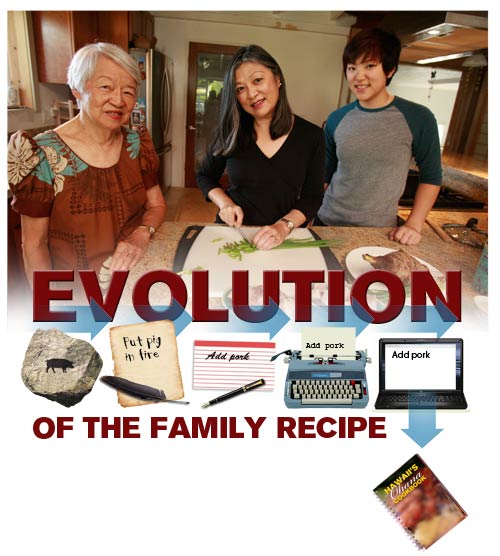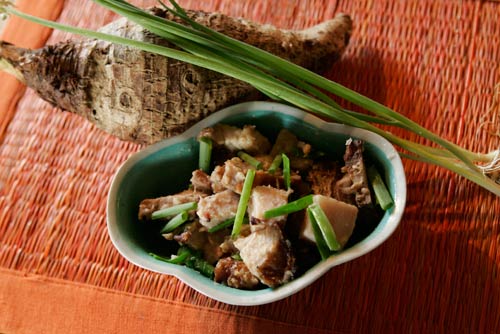Evolution of the family recipe

Malia Ogoshi prepares her late father’s best dish: roast pork and taro. Her mother, Jennie In, and daughter Jade keep her company in the kitchen.

Malia Ogoshi’s Roast Pork with Taro, a dish originated by her father, James Kau.


My mom certainly didn’t invent konbu maki, that delicious Japanese dish of pork pieces that are wrapped in konbu (seaweed), tied with kanpyo (dried gourd strips) and simmered in a soy-sugar-dashi sauce. But in our family, konbu maki was one of her signatures.
Be part of our cookbookGot a great family recipe you think others will enjoy? It may have a place in the tentatively titled "Hawaii’s Ohana Cookbook," set for release in the fall: » How to enter: Go to www.mutualpublishing.com Opens in a new tab and download an entry form. Fill in your recipe information, including pan sizes (if needed), ingredient quantities and instructions. Then tell us in 100 words or less how the dish originated and what makes it special. |
Those little morsels were a huge favorite at family parties. When Mom took requests, folks would often choose konbu maki over even her tofu salad, another top pick. My uncle, her brother, eventually started riffing on the recipe, asking her to add in a sliver of carrot or maybe some gobo to the wrapped package.
"You got any kine ideas, huh?" Mom would scold him from the kitchen table as she wrapped, pointing the tip of her paring knife at him for emphasis. "Why don’t you come here and help?"
My aunty, cousin and I would laugh from our seats at the table, our hands busy rolling those endless strips of seaweed. My uncle would just crack up and walk away.
Don't miss out on what's happening!
Stay in touch with breaking news, as it happens, conveniently in your email inbox. It's FREE!
The thing with these family recipes is they’re not simply about food. Just a bite into a beloved dish will bring forth recollections of people and events long past.
My family is no different from any other. Everyone has a story to tell about their special dishes. The Honolulu Star-Advertiser and Mutual Publishing want to gather these treasures in a cookbook, and they’re asking the community for recipe submissions. The tentatively titled "Hawaii’s Ohana Cookbook," slated for release in the fall, will include selected recipes accompanied by stories about the dishes written by family members.
Malia Ogoshi of Aiea, 53, has already submitted a recipe. It’s a simple combination of leftover Chinese roast pork, taro and green onion. While it is delicious, what’s equally important is that it came from her late father, James Kau.
"I remember this one because it’s really good and I was really impressed," she recalls of being introduced to the dish when she was about 6 or 7. "It was always a happy time when we had roast pork, and this is a ‘Part II’ dish — you know how there’s always turkey jook after Thanksgiving? This is Part II of the roast pork."
Ogoshi and her brother grew up in Kaneohe and were accustomed to being fed by their mother. Their father married late in life and, other than the roast pork recipe, cooked only "disgusting bachelor food."
"I remember thinking that if it were ever in my future to have only one parent, it could not be him because he couldn’t feed me. His food was really bad, and you know, back in those days there was no Food Network," she says.
"People of my generation talk about what their dads fed them when their moms were giving birth, because it was usually always their moms or grandmas taking care of them. The misery of it was that dads would make terrible food and serve it until it was gone."
For Ogoshi, food has been a means of maintaining intimacy and connection.
"The older I get, the more I feel connected to certain dishes, especially those of people who are gone," she says. "The saddest thing is when I hear, ‘So-and-so died, and that dish went with him.’ Memories are flat, but when we go through the activity of eating someone’s special dish, we get a whole experience of that person even though they’re not here anymore."




